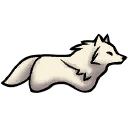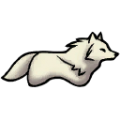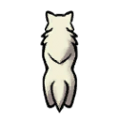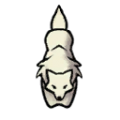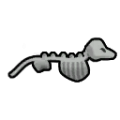Arctic wolf
Arctic wolf
An arctic variant of the old Earth wolf. As pack hunters, wolves have a complex social life and are fiercely intelligent.
Base Stats
- Type
- Animal
- Flammability
- 70%
Pawn Stats
- Combat Power
- 75
- Move Speed
- 5 c/s
- Health Scale
- 99% HP
- Body Size
- 0.85
- Mass - Baby
- 10.2 kg
- Mass - Juvenile
- 25.5 kg
- Mass - Adult
- 51 kg
- Carrying Capacity
- 64
- Filth Rate
- 2
- Hunger Rate
- 0.29 Nutrition/Day
- Diet
- carnivorous
- Life Expectancy
- 12 years
- Manhunter Chance
- 100%
- Manhunter Chance (Taming)
- 30%
- Trainable Intelligence
- Advanced
- Wildness
- 85%
- Minimum Handling Skill
- 8
- Mate Interval
- 12 hours
- Maturity Age
- 0.5 years (30 days)
- Juvenile Age
- 0.2 years (12 days)
- Comfortable Temp Range
- -55 °C – 40 °C (-67 °F – 104 °F)
Production
- Meat Yield
 119 wolf meat
119 wolf meat- Leather Yield
 36 wolfskin
36 wolfskin- Gestation Period
- 10 days
- Offspring Per Birth
- 1-3 (1.721 avg)
Melee Combat
- Attack 1
- Front left paw
10.9 dmg (Scratch)
16 % AP
2 second cooldown
0.5 chance factor
Stun for 280 ticks (4.67 secs) on first strike - Attack 2
- Front right paw
10.9 dmg (Scratch)
16 % AP
2 second cooldown
0.5 chance factor
Stun for 280 ticks (4.67 secs) on first strike - Attack 3
- Teeth
12 dmg (Bite)
18 % AP
2 second cooldown
0.9 chance factor
Stun for 280 ticks (4.67 secs) on first strike - Attack 4
- Head
6 dmg (Blunt)
9 % AP
2 second cooldown
0.2 chance factor - Average DPS
- 3.6332
- tradeTags
- AnimalUncommon, AnimalFighter
Arctic wolves, called arctic wolf puppies as babies, are pack hunters but are often seen alone or in pairs in-game. They are almost identical to timber wolves, differing only in habitat, resistance to cold temperatures and coloration. Arctic wolves can be found in boreal forests, cold bogs, tundra, ice sheets, and sea ice.
Diet[edit]
Arctic wolves feed on raw meat, corpses, meals, any processed foods, and kibble. When especially hungry, they will frequently attempt to attack, kill, and eat pets or even colonists for food.
Analysis[edit]
Arctic wolves can make for good hauling animals and decent attack animals, if you can keep them fed. While they are more wild than a husky, meaning they create more filth and need to be retrained, arctic wolves will not be attacked by other predators. You can feed them off meals, and wolves are actually more efficient than huskies when it comes for hunger rate. However, you'll need raw meat or kibble to train them.
Cougars and panthers are easier to tame, need to be retrained less often, and carry more in a single stride (at the same movement speed). They are also stronger in combat, all at the cost of 11% more hunger. However, these cats tend to spawn in warm biomes, while wolves spawn in cold ones.
Training[edit]
This animal can be trained as follows:
| Guard: | |
|---|---|
| Attack: | |
| Rescue: | |
| Haul: | |
*As of version 1.1.2610, all animals can be tamed. The percentage of likelihood of success depends on factors such as the Animals Wildness Percentage, Pawn Handling Skill, and others. More information can be found on the animals page.
Health[edit]
| Part Name | Health | Quantity | Coverage[1] | Target Chance[2] | Subpart of | Internal | Capacity[3] | Effect if Destroyed/Removed |
|---|---|---|---|---|---|---|---|---|
| Body | 39.6 | 1 | 100% | 21% | N/A[4] | - | Death | |
| Tail | 9.9 | 1 | 7% | 7% | Body | - | - | |
| Spine | 24.75 | 1 | 3% | 3% | Body | Moving |
−100% Moving[5] | |
| Stomach | 19.8 | 1 | 3% | 3% | Body | Digestion |
−50% Digestion | |
| Heart | 14.85 | 1 | 3% | 3% | Body | Blood Pumping |
Death | |
| Lung | 14.85 | 2 | 3% | 3% | Body | Breathing |
−50% Breathing. Death if both lost. | |
| Kidney | 14.85 | 2 | 3% | 3% | Body | Blood Filtration | −50% Blood Filtration. Death if both lost. | |
| Liver | 19.8 | 1 | 3% | 3% | Body | Digestion |
Death | |
| Neck | 24.75 | 1 | 20% | 5% | Body | Eating Talking Breathing |
Death | |
| Head | 24.75 | 1 | 75% | 2.25% | Neck | - | Death | |
| Skull | 24.75 | 1 | 25% | 1.125% | Head | - | Cannot be destroyed Increasing Pain based on damage. | |
| Brain | 9.9 | 1 | 70% | 2.625% | Skull | Consciousness |
Death Damage always results in scarring. | |
| Eye | 9.9 | 2 | 12% | 1.8% | Head | Sight |
−25% Sight. −100% if both lost. Damage always results in scarring. 0% Hit Chance against Blunt damage. | |
| Ear | 11.88 | 2 | 8% | 1.2% | Head | Hearing |
−25% Hearing. −100% if both lost. | |
| Nose | 9.9 | 1 | 10% | 1.5% | Head | - | - | |
| AnimalJaw | 9.9 | 1 | 10% | 1.5% | Head | Manipulation |
−100% Manipulation. Can no longer use Bite attack. | |
| Front Leg | 29.7 | 2 | 7% | 5.95% | Body | Moving |
−25% Moving. −50% if both lost. Can no longer use paw attack.[6] | |
| Front Paw | 9.9 | 2 | 15% | 1.05% | Front Leg | Moving |
−25% Moving. −50% if both lost. Can no longer use paw attack. | |
| Rear Leg | 29.7 | 2 | 7% | 5.95% | Body | Moving |
−25% Moving. −50% if both lost. | |
| Rear Paw | 9.9 | 2 | 15% | 1.05% | Rear Leg | Moving |
−25% Moving. −50% if both lost. |
- ↑ Coverage determines the chance to hit this body part. It refers to the percentage of the super-part that this part covers, before its own sub-parts claim their own percentage. For example, if the base coverage of the super-part is 100%, and the coverage of the part is 20%, 20% of hits would hit the part, and 80% the super-part. If the part had its own sub-part with 50% coverage, the chances would be 10% sub-part, 10% part, 80% super part.
- ↑ Target Chance is the actual chance for each part to be be selected as the target when each part's coverage has been taken into account(I.E. Neck covers 7.5% of Torso but Head covers 80% of Neck so it actually has only a 1.5% chance to be selected). This is not pure hit chance, as different damage types propagate damage in different ways. See that page for details.
- ↑ Note that capacities can affect other capacities in turn. Only the primary effect is listed. See specific pages for details.
- ↑ This is the part that everything else connects to to be considered 'connected'.
- ↑ If Moving drops below 16% a pawn cannot move.
- ↑ A Scratch attack that varies from animal to animal. Each front paw allows one attack.
Gallery[edit]
Version history[edit]
- Beta 19/1.0 - Trainable intelligence Advanced -> Intermediate, bite damage 11 -> 12, scratch usage commonality 100% -> 50% per side, nuzzle interval 120 -> 240 hours
